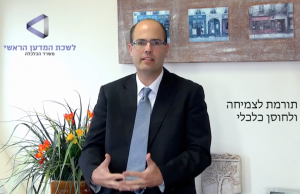The MAGNET (Generic Technology R&D) committee, headed by the Chief Scientist in the Israel Ministry of Economy Avi Hasson, has given a green light to Atid – a consortium to produce aviation constructions printed three-dimensionally in titanium – which will start working in the second half of 2015.
The significance of this approval is that the consortium can continue its preparations, including outlining mission statements and generating work plans for the next three years, including a detailed plan for the first year.
The Atid consortium – led by Cyclone, an affiliate of Elbit Systems – will develop generic technologies which can serve as an infrastructure for manufacturing optimal buildings for the Israeli aviation industry by printing them in 3D. The consortium will not develop printers but rather use existing printers for the planning and manufacturing of complex aviation-related structures.
The innovative aspect of the consortium will be the ability to plan and manufacture geometrically complex structures which can only be manufactured via 3D printing.
The companies making up the consortium are Cyclone, the Israel Aerospace Industry, Israeli Military Industries, Orbit, Algat, CAS, Admar and researchers from the University of Tel Aviv, Ben Gurion University, the Technion, the Metallurgical Institute and Afeka College, among others.
Avi Hasson, Chief Scientist at the Israeli Ministry of Economy, remarked that “The field of 3D printing is taking its first strides in manufacturing processes. This is a fascinating new field which can be expected to significantly influence processes and products in the future. It is important that Israel enter the world of 3D printing and it will be a challenge to do so with components that meet stringent standards, as is in the aviation industry”
Ilan Peled, director-general of the MAGNET Committee, added that “This third consortium, in addition to the already approved Infomedia and Omek Consortia, effectively completes the consortium program for 2015, in which there are 12 active consortia with a total working budget of NIS200 million.”



















